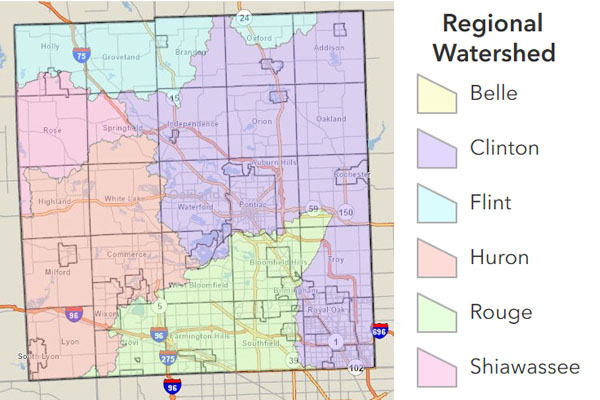Stormwater Pollution Prevention
Stormwater Management
Oakland Community College (OCC) encourages students, employees and the community to
work together to protect our waterways by reducing pollution in stormwater systems.
Rain and melted snow on OCC campuses flow into storm sewers, which eventually discharge
directly into nearby rivers, wetlands and lakes without treatment. OCC has campuses
that are in the Rouge River, Huron River and Clinton River Watersheds. As a result,
pollutants entering our storm sewers can travel long distances, affecting the environment
and potentially threatening local communities.
What can you do to prevent stormwater pollution?
- Never dump chemicals down storm drains! Only rain and snow should enter our storm
sewers.
- Place trash in designated containers and cover outdoor trash bins.
- Minimize salt use during winter.
- Reduce or eliminate pesticide use and apply only in areas less likely to be carried
by runoff into storm drains.
How to report a spill
To report a spill or pollutant release, contact OCC Public Safety at (248) 858-4911, or 5555 from a campus phone.
Stormwater Management Plan
To protect our waterways, OCC has created a Stormwater Management Plan (SWMP) that
outlines strategies to reduce pollutants in stormwater runoff. Pollutants can harm
ecosystems by killing plants and animals, and by making waterways unsafe for both
wildlife and humans. Review OCC’s Stormwater Management Plan (PDF).
Frequently Asked Questions
Stormwater runoff is water from rain or melting snow that doesn’t soak into the ground.
It picks up garbage, bacteria, chemicals and other pollutants as it runs off hard
surfaces, like pavement and roofs, and carries these pollutants to our streams, ponds,
and wetlands.
When it rains or snows, stormwater runoff is directed to storm drains, which can be
found in parking lots and along the edges of paved roads. This water flows to underground
pipes that eventually empty into bodies of water like streams, rivers or wetlands.
Storm sewers are designed to redirect stormwater runoff from hard surfaces so that
it does not pool in unwanted areas. Sanitary sewers collect wastewater from homes
and other buildings, and direct it to wastewater treatment plants for treatment.
Household hazardous waste includes paints, cleaners, oils, batteries, pesticides,
and other hazardous products that can contribute to pollution if not disposed of properly.
Never dispose of household hazardous waste down a storm drain.
While Oakland County does not have a county-wide household hazardous waste disposal
program, some organizations provide collection services to local communities. In addition,
some communities operate independent programs.
Contact these organizations for upcoming collection dates:
When washing or power washing anything outdoors, use only water when appropriate.
If a cleaning agent must be used, look for the least-toxic alternative, with biodegradable
ingredients, so as to reduce our impact on the local environment. Avoid letting any
runoff go down the storm drains.
Grass clippings, leaf debris, and animal wastes can all clog and pollute the storm
sewer system if they enter a storm drain. These items should be properly packaged
and sent away with your regular trash removal.
A septic system is a household wastewater treatment system for homes that are not
connected to a sanitary sewer system. If a septic system is not maintained and it
fails, polluted wastewater can leach into the soil. The water can make its way to
low-lying areas and negatively affect wetlands and potentially larger bodies of water.
Both storm sewer systems and septic systems must be well-maintained to avoid polluting
our local waterways.
To avoid septic system failure, do not pour oil or grease down your sink, nor any
items that can be considered household hazardous waste, as described above. Avoid
flushing items in the toilet that aren’t biodegradable. Septic systems should be
inspected by professionals every 1-3 years and have their contents pumped out every
3-5 years, depending on usage. If the ground around the septic tank becomes soggy
or develops a bad odor, this could be evidence of septic system failure.
Green infrastructure, including green roofs, rain gardens, and permeable pavements,
as well as low-impact development practices can greatly reduce the impact of development
activities on a property. Any time you can reduce the amount of paved or other hard
surfaces, you reduce the amount of runoff from rain and snow, and therefore the potential
for pollution being carried to our waterways. More information on green infrastructure
and low-impact development can be found online.
Many of OCC’s operation, renovations, and construction activities have the potential
to negatively impact stormwater and surface waters. To minimize these impacts, OCC
has implemented Standard Operating Procedures to instruct employees and students on
best-management practices for pollution prevention. In addition, OCC works closely
with the Oakland County Water Resources Commission to ensure that its construction
and renovation projects cause minimal harm to the environment. To further help the
College reduce its contribution of pollutants to stormwater, it continues to seek
assistance from and work with the various Watershed Councils and preservation organizations.

